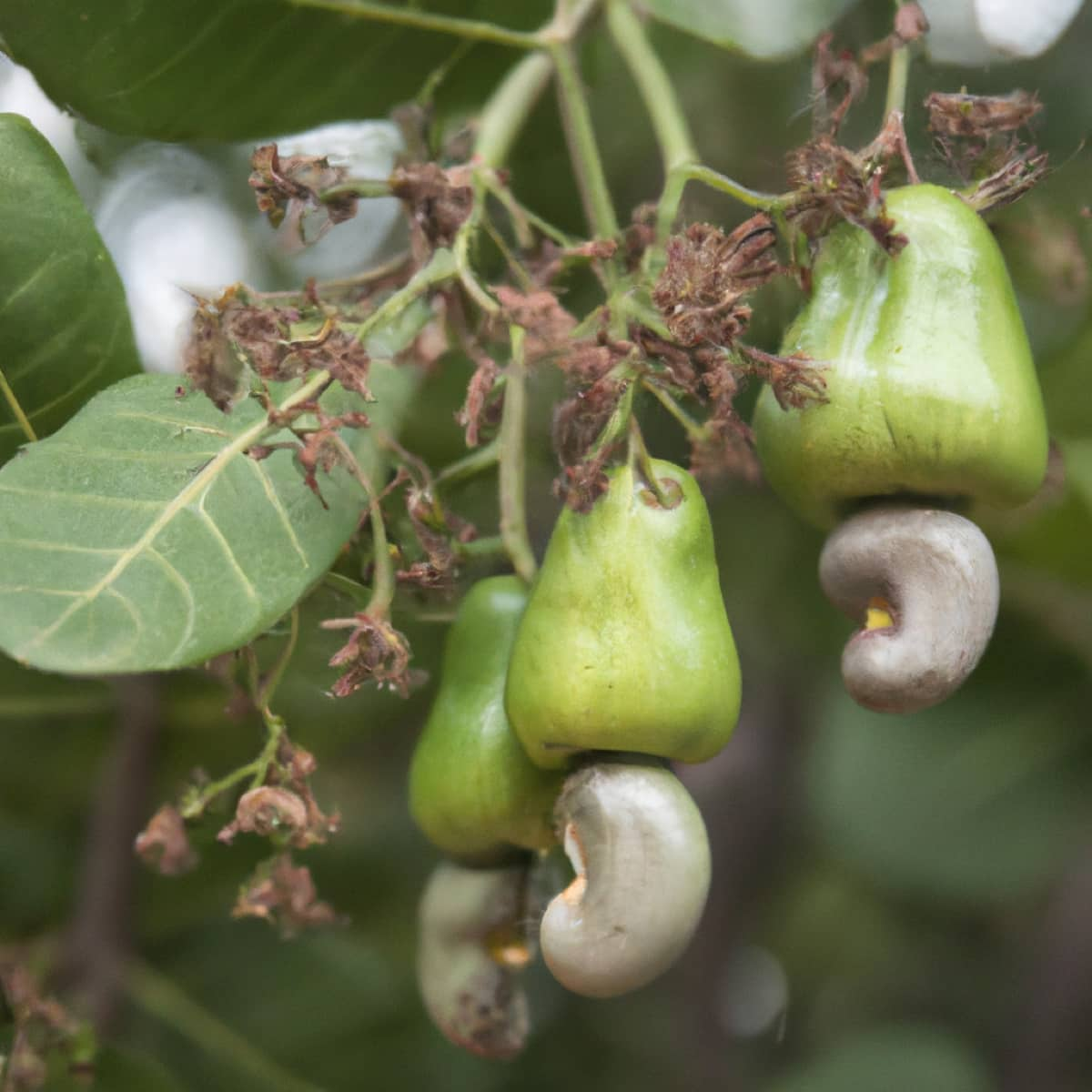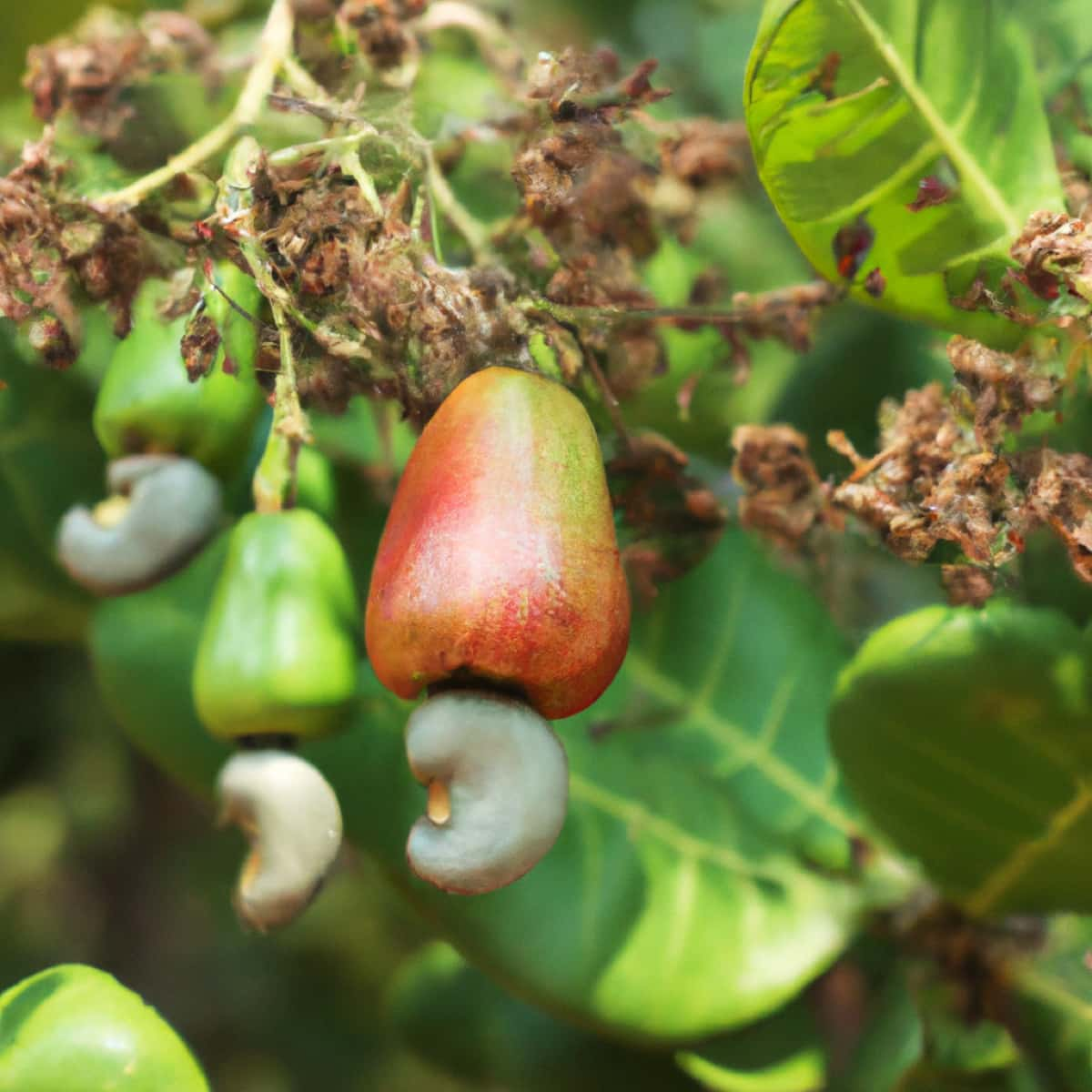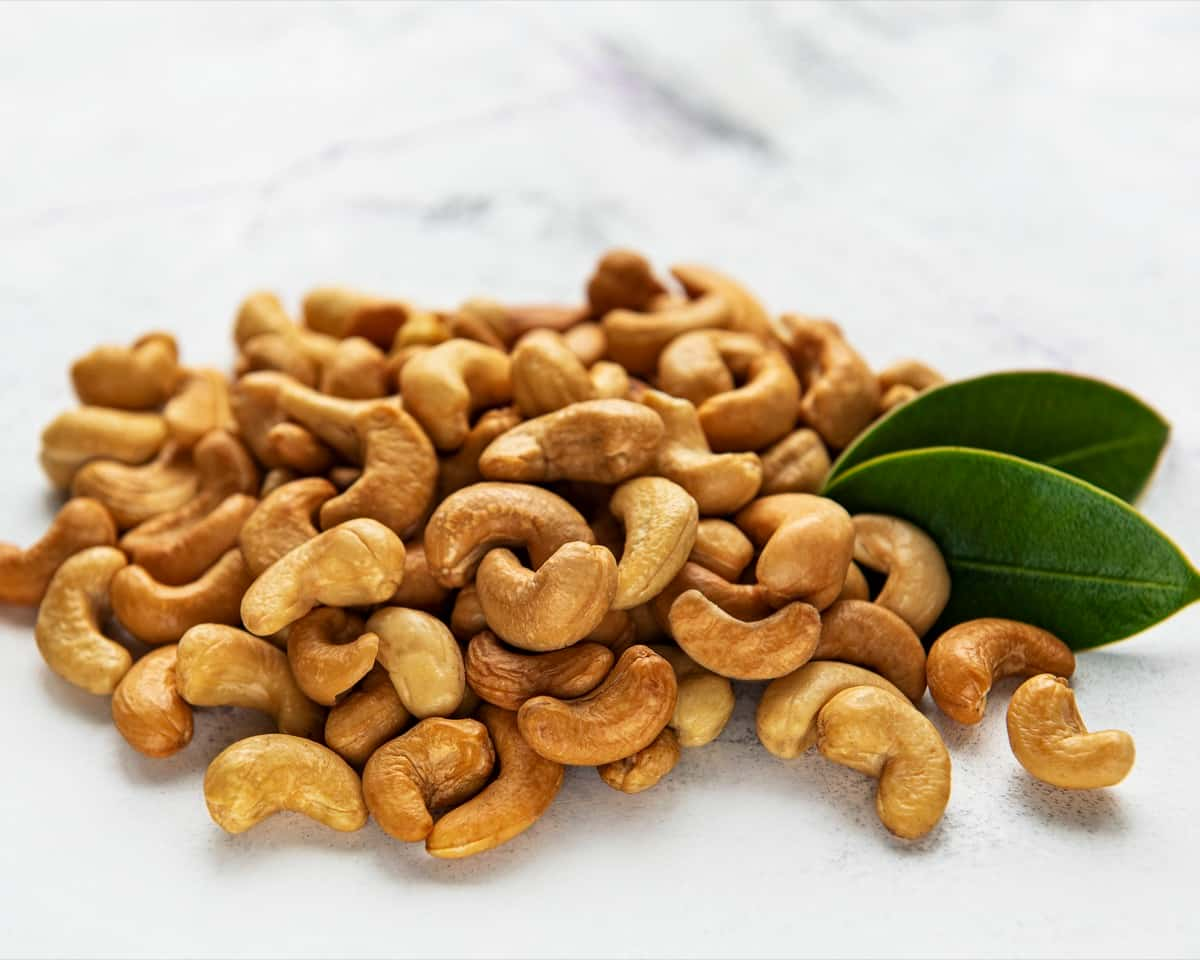Cashew farming is an economically viable venture with significant profit potential. This analysis provides an overview of the cost and profit dynamics of establishing and operating a one-acre cashew farm. By examining the economic aspects, project viability, and expected returns, this report serves as a valuable resource for individuals interested in engaging in cashew farming and understanding the financial implications of such an investment.

What is Cashew Farming?
Cashew trees can reach impressive heights of up to 12 meters (40 feet) in fertile soil and high humidity conditions. Their elliptical leaves are arranged spirally and have a leathery texture. The unique cashew fruit, not a true nut, resembles a thick bean with one end embedded in a swollen stem called the cashew apple.
The cashew apple, an accessory fruit, is significantly larger than the real fruit and can be red or yellow. The real fruit has two shells—an outer smooth and elastic olive green shell that turns pale brown when ripe and an inner harder shell that protects the edible seed. A brown oily resin is produced between these shells, which can cause skin blisters. Cashew apples are handpicked, and the curved fruits are sun-dried.
In some regions, they are roasted over burning logs to burst open the shells and release caustic resin, which can be harmful. However, improved methods involve roasting in cylinders to eliminate the poisonous properties. The inner shells are manually cracked open, and the kernels are heated to remove the seed coat.
Market and Demand for Cashew Farming
The global cashew market is witnessing a surge in demand due to the various health benefits associated with cashews, such as immunity-boosting, blood pressure control, and weight management. Additionally, the market is experiencing growth by introducing innovative flavors like chili lime and sweet and spicy cashew nuts.
Post-pandemic, the demand for healthier food options is expected to drive the demand for cashews further. In the long term, the US and EU markets are projected to exhibit stable growth (around 5% annually) driven by changing consumer eating habits and the preference for healthier snacks and vegetable protein sources.
Best High-Yielding Variety for Cashew Farming
A wide range of high-yielding cashew varieties is cultivated globally, with notable options such as Ullal-1, Dhana, Madakkathara-2, Chintamani-1, Chintamani-2, Bhaskara, Vengurla-3, Vengurla-4, Priyanka, and Amrutha12. Out of these varieties, Ullal-1, Dhana, and Madakkathara-2 have demonstrated superior performance compared to others. These varieties have shown commendable yields and are favored by cashew farmers for their productivity and desirable traits.
Best Package and Practices for Cashew Farming
Site Selection: Choose a well-drained site with deep, loamy soil rich in organic matter. Cashew trees thrive in areas with a temperature range of 20-30°C (68-86°F) and annual rainfall between 1000-2500 mm (39-98 inches).
Land Preparation and Planting: Prepare the land by removing weeds and debris. Conduct soil testing to determine nutrient deficiencies and amend the soil accordingly. Cashew trees are usually propagated through grafting or budding. Plant the cashew seedlings at a spacing of 8-10 meters (26-33 feet) between rows and 7-8 meters (23-26 feet) between plants.
Irrigation and Water Management: Cashew trees require regular watering, especially during dry spells. Implement an efficient irrigation system such as drip or sprinkler irrigation to provide adequate moisture. Proper water management is crucial during the flowering and fruit development stages.
Fertilizer Application: Based on soil test results, apply balanced fertilizers, including nitrogen (N), phosphorus (P), and potassium (K), in appropriate proportions. Apply organic manure and micronutrients to enhance soil fertility and ensure healthy tree growth.
Pest and Disease Management: Implement integrated pest management (IPM) strategies to control pests such as cashew stem and root borer, scale insects, and leaf miners. Regular monitoring, early detection, and timely application of appropriate insecticides or biological control agents are vital. Preventive measures against fungal diseases like powdery mildew and root rot should also be taken.
In case you missed it: 9 Causes of Dying Cashew Trees and How to Fix Them?

Weed Control: Regularly weed the cashew plantation to minimize competition for nutrients, water, and sunlight. Mulching around the trees can help suppress weeds and conserve soil moisture.
Pruning and Training: Prune cashew trees during the dormant period to maintain an open canopy, promote air circulation, and facilitate sunlight penetration. Training young trees through properly shaping and removing suckers is essential for desired tree structure and optimal fruiting.
Harvesting: Cashew nuts are ready for harvest when the cashew apple turns yellow or red. Harvest the nuts carefully by hand, as the fruits are delicate. Avoid damaging the nuts during harvesting to maintain quality.
Post-Harvest Management: Remove the cashew nuts from the apple, dry them in the sun, or use mechanical dryers until the moisture content is around 8-10%. Proper drying ensures longer shelf life and reduces the risk of fungal infections. Store the dried cashew nuts in moisture-proof containers to maintain their quality.
1-Acre Cashew Farming Cost and Profit
The components included in the cost of cultivation for Cashew farming typically consist of seeds, land preparation, fertilizers, organic manure/compost, irrigation, weed management, pest and disease control, harvesting and threshing, post-harvest management, and miscellaneous expenses.
| Expense Category | Cost Range (USD) |
| Land Preparation | $150 – $200 |
| Seedlings or Grafts | $200 – $250 |
| Fertilizers | $250 – $300 |
| Irrigation System | $150 – $200 |
| Pest and Disease Management | $200 – $250 |
| Weed Control | $100 – $150 |
| Pruning and Training | $100 – $150 |
| Harvesting | $100 – $150 |
| Post-Harvest Management | $200 – $250 |
| Miscellaneous | $200 – $250 |
| Total Cost Range | $1850 – $1900 |
Total Returns and Net from 1Acre Cashew Farming
Total Returns Calculation: Average yield range of 8 to 10 quintals from 1-Acre, the total cashew nuts produced would be between 800 kg (8 quintals) and 1000 kg (10 quintals).
- Total Returns = Total Quantity * Price per Quintal Total Returns = (800 kg to 1000 kg) * ($109 USD per quintal)
- Net Income Calculation: Net Income = Total Returns – Cost of Cultivation
Calculate the net income considering the minimum and maximum values for both the Yield and cost of cultivation:
- Minimum Yield (8 quintals) and Minimum Cost ($1850):
- Total Returns = 800 kg * $109 = $87,200
- Net Income = $87,200 – $1850 = $85,350
- Maximum Yield (10 quintals) and Maximum Cost ($1900):
- Total Returns = 1000 kg * $109 = $109,000
- Net Income = $109,000 – $1900 = $107,100
Therefore, the net income from 1-acre cashew farming can range from $85,350 to $107,100, depending on the Yield and cost of cultivation.
In case you missed it: How to Start a Cashew-Nut Processing Business: A Profitable Agriculture Idea

Challenges and Risks in Cashew Farming
Cashew farming presents certain challenges and risks. These include susceptibility to pests and diseases such as powdery, downy mildew, and root rot, which can impact Yield and quality. Unpredictable weather patterns, including drought and excessive rainfall, pose risks to cashew cultivation. Additionally, market fluctuations, price volatility, and competition in the cashew industry can affect profitability. Adequate pest management, disease control measures, and risk mitigation strategies are crucial for successful cashew farming.
Conclusion
Cashew farming on a one-acre scale presents a promising opportunity for profitability. While the cost of cultivation ranges from $1850 to $1900 USD, the potential net income can range from $85,350 to USD 107,100, considering a yield of 8 to 10 quintals per acre and a cashew price of USD 109 per quintal. With proper management and adherence to best practices, cashew farming can be a financially rewarding venture.
- Ultimate Guide to Ossabaw Island Hog: Breeding, Raising, Diet, and Care
- Ultimate Guide to Juliana Pig: Raising Facts, Size, Diet, Care, and Lifespan
- Raising Lleyn Sheep: Disadvantages, Price, Uses, Characteristics, and Care
- Ultimate Guide to Meishan Pig: Breed Facts, Breeding, Raising, and Care
- Ultimate Guide to Teacup Pigs: Raising, Diet, Lifespan, Cost, and Care
- Guide to Raising Poll Dorset Sheep: Facts, Profile, Characteristics, Uses, and Care
- Ultimate Guide to Bighorn Sheep: Characteristics, Diet, Lifespan, Breeding, and Lifecycle
- Ultimate Guide to Raising Katahdin Sheep: Farming Facts, Breed Profile, Uses, and Care
- Ultimate Guide to Raising Oreo Cows: Belted Galloways Farming Facts, Profile, Uses, and Care